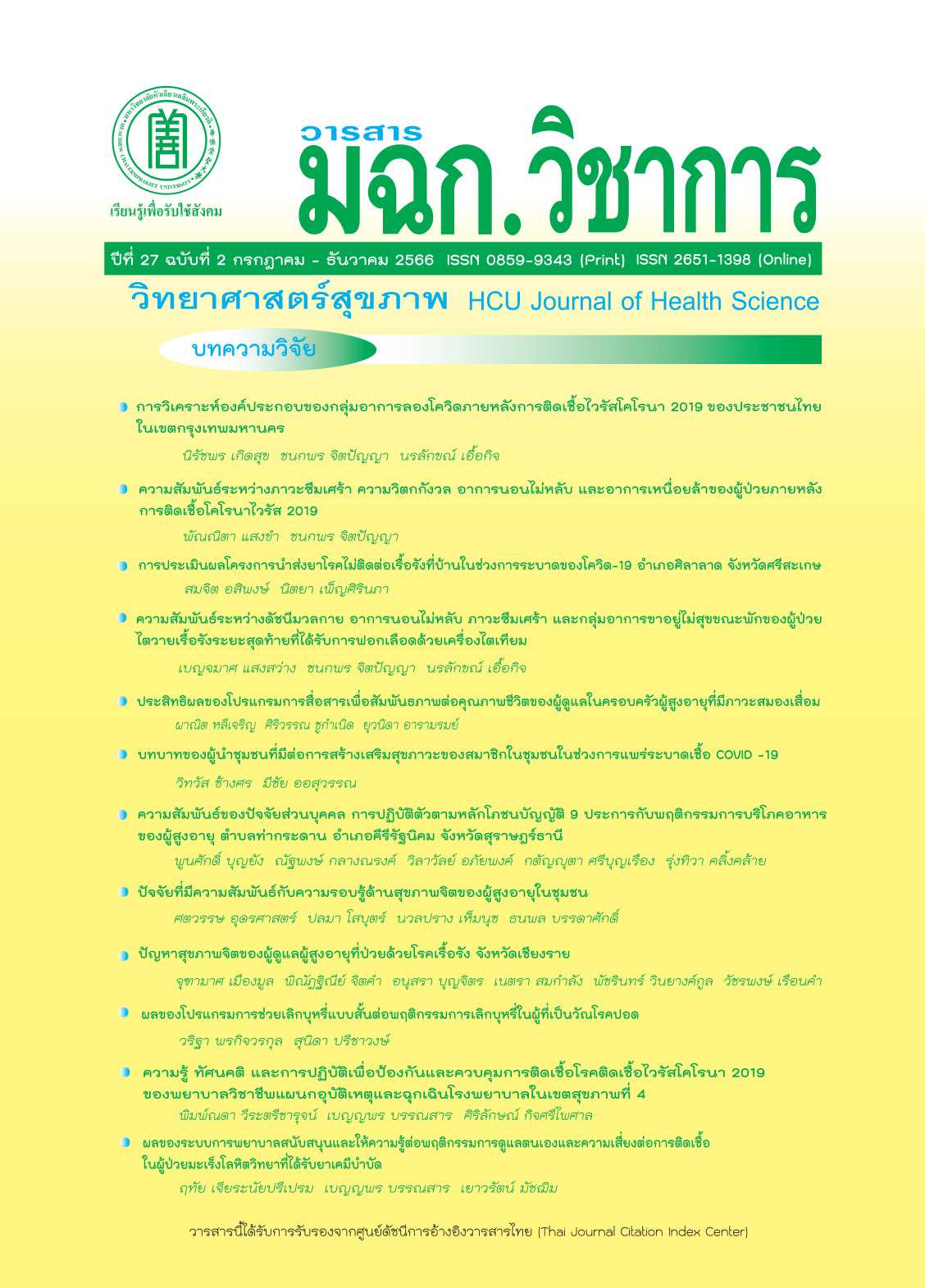The Effects of the Supportive Educative Nursing System on Self-care Behaviors and Risk for Infection Among Hematological Cancer Patients Receiving Chemotherapy
Keywords:
educative supportive nursing system, self-care behavior, risk of infection, hematological cancer patientsAbstract
This quasi-experimental study aimed to examine effects of an educative supportive nursing system on the self-care behaviors and risk of infection among hematological cancer patients receiving chemotherapy. The participants were randomized to the intervention group (n = 30) and the control group (n = 30). The intervention group received a four-week program developed from Orem's theoretical concepts, consisting of: 1) teaching, 2) guiding, 3) support and encouragement, and 4) creating a supportive environment. The control group received usual care. The instruments used for collecting data included: 1) a demographic data form, 2) a risk of infection form, and 3) a self-care behavior form. Data were analyzed using descriptive statistics, chi-squared test, dependent and independent t-tests. After the completion of intervention, the mean score of self-care behavior of the experimental group was statistically higher than at baseline and the control group (p< 0.001). The level of risk of infection (the risk of infection = 23.3%, the risk of precaution infection = 76.7%) was lower than the control group (the risk of infection = 53.3%, the risk of precaution infection = 46.7%). This study shows that an educative supportive nursing system can improve self-care behaviors and reduce the risk of infection among hematological cancer patients receiving chemotherapy. Therefore, nurses may consider implementing this program among cancer patients receiving chemotherapy in order to enhance their self-care behaviors and reduce risk of infection.
Downloads
References
Leukemia & Lymphoma American Cancer Society. Facts & Stastistics overview [Internet].; 2021 [cited 2023 April 11]. Available from: Lymphoma Survival Rate/Blood Cancer Survival Rates/LLS
Strategy and Planning Division Ministry of Public Health. Public Health statistics 2016 (health information group). Nonthaburi: Strategy and Planning Division Ministry of Public Health; 2016.
Teparat P, Kanitsap N. Potential risk factors of febrile neutropenia in cancer patients receiving chemotherapy. Thammasat Medical Journal 2015;15(2):200-209. (in Thai).
Lekdamrongkul P. Nursing management and assessment of febrile neutropenia (FN) risks in cancer patients treated with chemotherapy: the role of nurses. Thai Journal of Nursing Council 2015;30(1):5-15. (in Thai).
Akenoot S, Lertwatthanawila W, Wonghongkul T. Effects of self-management enhancement on infection prevention practices and incidence of infection among patients with leukemia and lymphoma receiving chemotherapy. Nursing Journal 2016;-43(suppl.):-207-16. (in Thai).
Temtap S, Hiruchunha S, Nilmanat. Development of self-care promotion among patients with acute myeloid leukemia (AML) and receiving chemotherapy. SCNJ;- 2015;-2(3):-21-40. (in Thai).
Boonnu D. Risk and risk management of infection among hematological cancer patients who have received chemotherapy. [Thesis]. Songkla: Prince of Songkla University; 2011. (in Thai).
Orem DE. Nursing concepts of practice. 6th ed. St.Louis: Mosby; 2001.
Klastersky J. Management of febrile neutropenia: ESMO Clinical Practice Guidelines. Annals of Oncology 2016;27(5):111-18.
Cohen J. Statistical power analysis for the behavioral sciences. 2nd ed. Hillsdale, NJ: Lawrence Erlbaum Associates; 1988.
Srisatidnarakul B. The methodology in nursing research. 5th ed. Bangkok:, Chulalongkorn University book center; 2010.
Jindakul P, Namvongprom A, Pakdevong N. Effectiveness of the educative-supportive program on self care ability, perceived intensity of side effects of chemotherapy and anxiety among patients with early breast cancer under-going adjuvant chemotherapy. Thai Cancer Journal 2018;38(3):105-16. (in Thai).
Tesamut L, Vannarit T, Tantiworawit A. Factors predicting health behaviors among persons with acute myeloblastic leukemia receiving chemotherapy. Nursing Journal 2017;44(1):45-56. (in Thai).
Pongprathet J, Sittisombut S, Soivong P. The effect of supportive-educative nursing system on fatigue among acute leukemia persons receiving chemotherapy. Nursing Journal 2021;48(1):15-27. (in Thai).
Wongsawassot A, Temthup S, Ponmad S. Effects of the educative supportive nursing program on dietary self care and serum albumin of patients with hepatocellular carcinoma. Thai Journal of Nursing and Midwifery Practice 2021;8(2):72-86. (in Thai).
Paritsiraprapa C, Kosol S. Effectiveness of an infectious prevention programfor patients with acute leukemiain hematology-oncology medicine ward at Surat Thani hospital. Journal of Health Sciences and Pedagogy 2021;1(2):83-96. (in Thai).
Downloads
Published
How to Cite
Issue
Section
License
Copyright (c) 2023 HCU Journal

This work is licensed under a Creative Commons Attribution-NonCommercial-NoDerivatives 4.0 International License.
บทความที่ได้รับการตีพิมพ์เป็นลิขสิทธิ์ของวารสารวิทยาศาสตร์สุขภาพและสุขภาวะ
ข้อความที่ปรากฏในบทความแต่ละเรื่องในวารสารวิชาการเล่มนี้เป็นความคิดเห็นส่วนตัวของผู้เขียนแต่ละท่านไม่เกี่ยวข้องกับมหาวิทยาลัยหัวเฉียวเฉลิมพระเกียรติ และคณาจารย์ท่านอื่นๆในมหาวิทยาลัยฯ แต่อย่างใด ความรับผิดชอบองค์ประกอบทั้งหมดของบทความแต่ละเรื่องเป็นของผู้เขียนแต่ละท่าน หากมีความผิดพลาดใดๆ ผู้เขียนแต่ละท่านจะรับผิดชอบบทความของตนเองแต่ผู้เดียว




